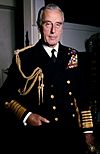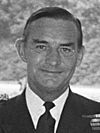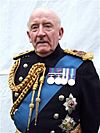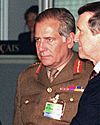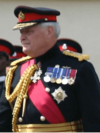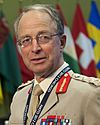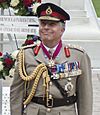Chief of the Defence Staff (United Kingdom) facts for kids
Quick facts for kids Chief of the Defence Staff |
|
|---|---|

|
|
| Ministry of Defence British Armed Forces |
|
| Abbreviation | CDS |
| Member of | Defence Council Chiefs of Staff Committee |
| Reports to | The Prime Minister Secretary of State for Defence |
| Nominator | Secretary of State for Defence |
| Appointer | The Monarch
on advice of the Prime Minister
|
| Formation | 1 January 1959 |
| First holder | Marshal of the RAF Sir William Dickson |
| Deputy | Vice-Chief of the Defence Staff |
The Chief of the Defence Staff (CDS) is the top military leader in the British Armed Forces. This person is the most important uniformed military advisor to the Secretary of State for Defence and the Prime Minister of the United Kingdom. The CDS works at the Ministry of Defence. They work closely with the Permanent Under-Secretary, who is the most senior non-military official there. The CDS holds the highest rank among all serving officers in the armed forces.
The King or Queen is officially the commander-in-chief of the armed forces. However, the Government of the United Kingdom actually makes the decisions. They use their special powers to guide the armed forces through the Ministry of Defence's Defence Council. The CDS is a key member of this council.
Currently, Admiral Sir Tony Radakin is the CDS. He took over from General Sir Nick Carter in November 2021. Air Chief Marshal Sir Rich Knighton has been announced as the next CDS. He will start his role in September 2025. The Secretary of State for Defence suggests who should be CDS to the Prime Minister. Then, the King or Queen approves the choice.
Contents
What the Chief of the Defence Staff Does
The CDS has many important jobs. These include:
- Leading the defence efforts alongside the Permanent Secretary.
- Creating plans for the future of the Armed Forces. This includes how they will grow and change.
- Managing current military operations as the main commander.
- Building strong relationships with the armed forces of other countries.
People Who Help the CDS
The CDS has a main helper called the Vice-Chief of the Defence Staff. Since 1997, this deputy has held a similar rank. Usually, they come from a different branch of the military than the CDS.
There are also several Deputy Chief of the Defence Staff (DCDS) roles. These people support the Vice-Chief. Some of these roles include:
- Deputy Chief of Defence Staff (Military Strategy & Operations).
- Chief of Defence People.
- Deputy Chief of Defence Staff for Military Capability.
The CDS works very closely with the Ministry of Defence's Permanent Under-Secretary. Both report directly to the Secretary of State for Defence. The CDS focuses on military actions and plans. The Permanent Under-Secretary handles money and rules for the Ministry.
A group called the Strategic Advisory Panel also helps the CDS.
History of the CDS Role
The job of Chief of the Defence Staff started in 1959. It was created because of new ideas about how different parts of the military could work together. These ideas became very important during the Second World War. The first person to hold the role was Marshal of the RAF Sir William Dickson. Before 1959, he was the chairman of the Chiefs of Staff Committee.
From 1959 until the late 1970s, the CDS job rotated strictly between the three main military branches. This means an officer from the Navy, then the Army, then the Air Force would take the role. This rotation changed when Marshal of the RAF Sir Andrew Humphrey passed away.
From the start until 1997, the CDS was always given the highest rank in their military branch. For example, an Admiral of the Fleet for the Navy or a Field Marshal for the Army. However, after the Cold War, the British Armed Forces became smaller. So, since 1997, the CDS keeps their rank of Admiral, General, or Air Chief Marshal. These are still very high ranks.
Even though there's no rule against it, few Royal Marines officers reach a high enough rank to be considered for the CDS role. However, in 2016, a Royal Marine officer named Gordon Messenger became a general. He was then appointed as the Vice-Chief of the Defence Staff.
Starting in April 2025, the CDS will also be in charge of the Military Strategic Headquarters (MSHQ). This means they will command the four service chiefs. They will also be responsible for designing forces and getting equipment for the armed forces.
| Royal Navy | British Army | Royal Air Force | Combined | |
|---|---|---|---|---|
| 1645 | N/A | Commander-in-Chief of the Forces (1645/60–1904, intermittently) | N/A | N/A |
| 1689 | Senior Naval Lord (1689–1771) | |||
| 1771 | First Naval Lord (1771–1904) | |||
| 1904 | First Sea Lord (1904–1917) | Chief of the General Staff (1904–1909) | ||
| 1909 | Chief of the Imperial General Staff (1909–1964) | |||
| 1917 | First Sea Lord and Chief of the Naval Staff (1917–present) | |||
| 1918 | Chief of the Air Staff (1918–present) | |||
| 1959 | Chief of the Defence Staff (1959–present) | |||
| 1964 | Chief of the General Staff (1964–present) |
List of Chiefs of the Defence Staff
| No. | Picture | Chief of the Defence Staff | Took office | Left office | Time in office | Defence branch | Life peerage | Ref |
|---|---|---|---|---|---|---|---|---|
| 1 | Marshal of the Royal Air Force Sir William Dickson (1898–1987) |
1 January 1959 | 12 July 1959 | 192 days | None | |||
| 2 | Admiral of the Fleet Louis Mountbatten, 1st Earl Mountbatten of Burma (1900–1979) |
13 July 1959 | 15 July 1965 | 6 years, 2 days | Hereditary peerage, Earl Mountbatten of Burma |
|||
| 3 | Field Marshal Sir Richard Hull (1907–1989) |
16 July 1965 | 4 August 1967 | 2 years, 19 days | None | |||
| 4 | Marshal of the Royal Air Force Sir Charles Elworthy (1911–1993) |
4 August 1967 | 8 April 1971 | 3 years, 247 days | Baron Elworthy | |||
| 5 | Admiral of the Fleet Sir Peter Hill-Norton (1915–2004) |
9 April 1971 | 21 October 1973 | 2 years, 195 days | Baron Hill-Norton | |||
| 6 | Field Marshal Sir Michael Carver (1915–2001) |
21 October 1973 | 24 October 1976 | 3 years, 3 days | Baron Carver | |||
| 7 | Marshal of the Royal Air Force Sir Andrew Humphrey (1921–1977) |
24 October 1976 | 24 January 1977 † | 92 days | None | |||
| - | Admiral of the Fleet Sir Edward Ashmore (1919–2016) Acting |
9 February 1977 | 30 August 1977 | 202 days | None | |||
| 8 | Marshal of the Royal Air Force Sir Neil Cameron (1920–1985) |
31 August 1977 | 31 August 1979 | 2 years | Baron Cameron of Balhousie | |||
| 9 | Admiral of the Fleet Sir Terence Lewin (1920–1999) |
1 September 1979 | 30 September 1982 | 3 years, 29 days | Baron Lewin | |||
| 10 | Field Marshal Sir Edwin Bramall (1923–2019) |
1 October 1982 | 31 October 1985 | 3 years, 30 days | Baron Bramall | |||
| 11 | Admiral of the Fleet Sir John Fieldhouse (1928–1992) |
1 November 1985 | 9 December 1988 | 3 years, 38 days | Baron Fieldhouse | |||
| 12 | Marshal of the Royal Air Force Sir David Craig (born 1929) |
9 December 1988 | 1 April 1991 | 2 years, 113 days | Baron Craig of Radley | |||
| 13 | Field Marshal Sir Richard Vincent (1931–2018) |
2 April 1991 | 31 December 1992 | 1 year, 273 days | Baron Vincent of Coleshill | |||
| 14 | Marshal of the Royal Air Force Sir Peter Harding (1933–2021) |
31 December 1992 | 13 March 1994 | 1 year, 72 days | None | |||
| 15 | Field Marshal Sir Peter Inge (1935–2022) |
15 March 1994 | 1 April 1997 | 3 years, 17 days | Baron Inge | |||
| 16 | General Sir Charles Guthrie (born 1938) |
2 April 1997 | 15 February 2001 | 3 years, 319 days | Baron Guthrie of Craigiebank | |||
| 17 | Admiral Sir Michael Boyce (1943–2022) |
16 February 2001 | 2 May 2003 | 2 years, 75 days | Baron Boyce | |||
| 18 | General Sir Michael Walker (born 1944) |
2 May 2003 | 28 April 2006 | 2 years, 361 days | Baron Walker of Aldringham | |||
| 19 | Air Chief Marshal Sir Graham "Jock" Stirrup (born 1949) |
28 April 2006 | 29 October 2010 | 4 years, 184 days | Baron Stirrup of Marylebone | |||
| 20 | General Sir David Richards (born 1952) |
29 October 2010 | 18 July 2013 | 2 years, 271 days | Baron Richards of Herstmonceux | |||
| 21 | General Sir Nicholas Houghton (born 1954) |
18 July 2013 | 14 July 2016 | 2 years, 362 days | Baron Houghton of Richmond | |||
| 22 | Air Chief Marshal Sir Stuart Peach (born 1956) |
14 July 2016 | 11 June 2018 | 1 year, 332 days | Baron Peach | |||
| 23 | General Sir Nicholas Carter (born 1959) |
11 June 2018 | 30 November 2021 | 3 years, 172 days | None | |||
| 24 | Admiral Sir Tony Radakin (born 1965) |
30 November 2021 | Incumbent | 4 years, 83 days | Incumbent |
Peerage for Former Chiefs
When Chiefs of Defence Staff retire, they usually receive a special honor. They are given a life peerage. This means they become a "peer" for life and can sit in the House of Lords. They are known as non-political crossbench peers. This appointment is suggested directly to the King or Queen by the Prime Minister. The Prime Minister can choose a few important public servants for this honor when they retire. For example, Sir Jock Stirrup became Baron Stirrup in 2010.
See Also
- Head of the British Armed Forces
 | Shirley Ann Jackson |
 | Garett Morgan |
 | J. Ernest Wilkins Jr. |
 | Elijah McCoy |




